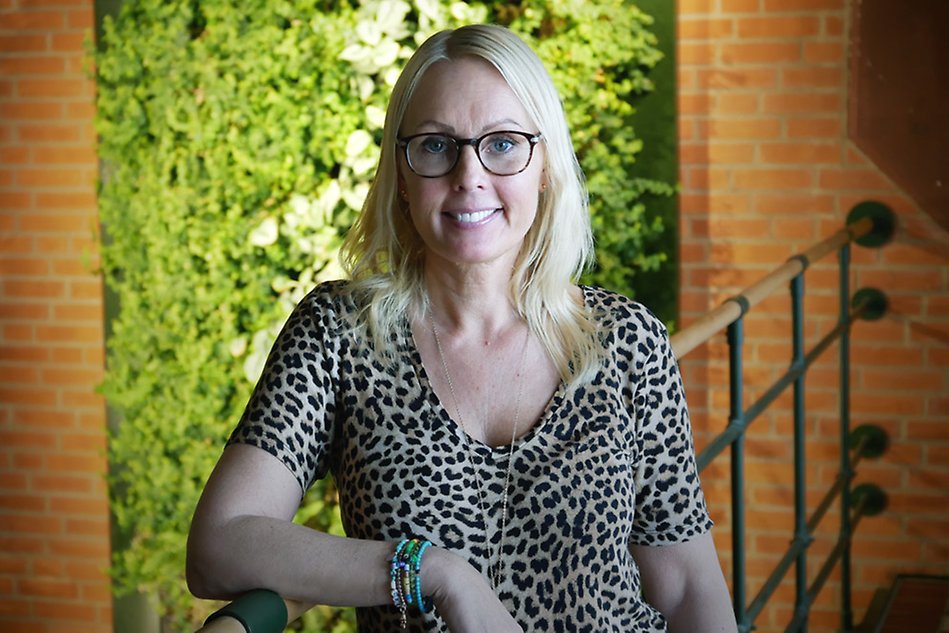Karin Weman awarded this year’s Collaboration and Innovation Prize
Halmstad University’s prize to recognise an employee, or a group of employees, who has been particularly successful in collaborating with society and industry, goes to Karin Weman this year.
”I’m absolutely delighted! It’s an honour and an affirmation. I collaborate a lot, at a local, national and international level”, says Karin Weman.

Karin Weman – a happy and well deserved prize winner of the Collaboration and Innovation Prize 2018.
“Karin Weman has proven to be particularly good at creating long-term external relationships and visibility for the University’s research, and this is why she is being awarded this year’s Collaboration and Innovation Prize,” says Vice-Chancellor Anders Nelson of this year’s prize-winner.
The prize consists of, in addition to the honour of course, a grant of SEK 10,000 to use in her role for purposes relating to collaboration and innovation.
We took the opportunity to take the pulse of Karin “Doctor of Motivation” Weman’s collaboration, with a few short questions and answers:
Congratulations Karin, tell us a bit about how you collaborate!
“Thank you! I have a large network and attend many international conferences. I’ve been invited as keynote speaker at an innovation conference at the University of North Carolina in the USA, and a group from there also paid us a visit here this spring with a group of students. I also collaborate with an authority in my field – Professor Geoffrey Williams, from New York – who has been here and led a special course and who will be hired within the framework of my research project (GoDis). Another international colleague with whom I collaborate is Ryan Rhodes from Victoria, Canada. I’ve also organised symposiums at international conferences in my research area and invited other professional researchers.
“Then I also cooperate at a national level – my research project (GoDis) has involvement from companies in Stockholm (Kairos Future and HPI) and Varberg (Tappa). I’ve collaborated with Halmstad Municipality and conducted a pro bono study for their electric cyclist project. And I also give lectures within the framework of the third task of research, and hold presentations on motivation for exercise for, among others, Region Halland, the Swedish Tax Agency, IF Metalla and the Book Fair, which of course I find important and fun.”
What do you as a researcher gain from collaboration?
“I’m curious, social and like to meet new people and to develop through the process. The reason I started studying and conducting research is that I want to help others find the joy and the positive effects of physical exercise, and of course I also want to pass on the results of my research.”
In what way does collaboration benefit research, in your view?
“I don't think you can have good research without collaboration – for example, we need to collaborate across disciplines and with relevant actors in society. Many researchers find it difficult to popularise their results, and much of the research in Social Sciences is only shared within the field of Social Sciences, which makes it difficult to make use of it. To create value, you have to reach out on a broad front. This is also one of the reasons why I write course literature and debate articles – I try to get my research out in different ways.”
What do the business people you collaborate with think – how does it benefit them to contribute to research, in your experience?
“They are very much on board, you can see that, for example, by the fact that they have been involved for so many years in my research project (GoDis).”
You appear regularly in the media, you get a lot of invitations?
“Yes, there’s usually an invitation virtually every week – over the last two years I must have appeared in the media about eighty times, including Good Morning Sweden (SVT).”
How do you find time for everything?
“I prioritise, because I think my job is important and fun. That’s why it feels so wonderful to receive this prize, it’s an affirmation that this seat of learning thinks that I’m doing good things and it’s an encouragement to continue. I want the University to have a good reputation and I want to put us on the map, both nationally and internationally – the group in the fields of Psychology and Sports Psychology is well-known internationally, we offer high-quality research and education, and we have a broad range of courses. It’s great when our successes are also recognised here at home.”
Text and photo: Karin Bergstrand
About the Prize for Collaboration and Innovation
Swedish research and education policy includes the development of new approaches to evaluate and reward collaboration and innovation. Collaboration has always been a particularly distinctive feature of Halmstad University, and this is a source of pride for the seat of learning – the Collaboration and Innovation Prize is a way of acknowledging this.

